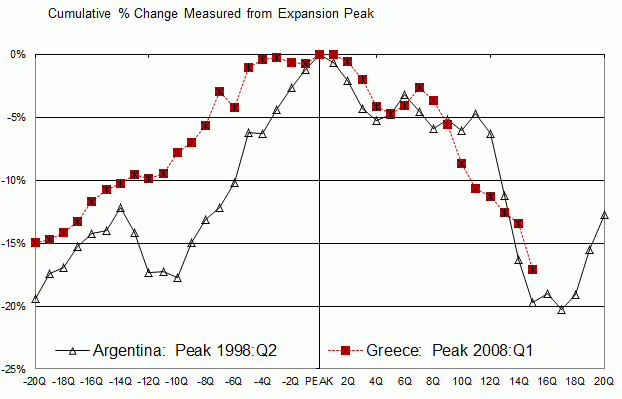Argentina’s deepening recession, run on banks and associated social unrest in 2000-1 stemming from its own policy mistakes forced it to default and abandon its US dollar currency peg. The Argentine peso depreciated dramatically. Inflation soared temporarily, battering standards of living. But the default and currency depreciation set the stage for a turnaround which, aided by a fortuitous bounce in commodity prices, spurred a strong export and investment-led economic rebound.
Greece’s deteriorating economic and financial conditions since spring 2010, and financial support efforts by third party policymakers, are strikingly similar in many ways to the Argentine collapse1. However, as a member of the European Monetary Union, Greece’s policy options are severely constrained – it cannot inflate or devalue its currency. There is no easy solution. The IMF/EC/ECB Troika has already invested heavily to prop up Greece. It must base future policies on even-handed assessments of the future costs and benefits of further financial support strategies versus managing a graceful Greece exit from the Eurozone.
There are many Greek-Argentine parallels:
- Argentina during much of the 1990s and Greece in the last decade lived beyond their means and maintained illusions of wealth and wellbeing.
- Both have a long financial history as “serial defaulters”.
- During the second half of the 1990s, Argentina’s soaring imports and consumerism and insufficient domestic saving constrained domestic production, generating wide trade and current account deficits that drained currency reserves. Greece’s 2002-7 economic expansion involved primarily debt-financed consumption, while its production and investment remained anaemic. Its government fiscal profligacy contributed to persistently large (primary) budget and current account deficits. Tax avoidance was rampant in both countries.
- Both Greece and Argentina suffered from deteriorating competitiveness, as their unit labour costs rose relative to international standards.
Greece maintained bloated and wasteful government employment and its public and private sector wages increased persistently faster than labour productivity gains. Argentina’s deteriorating competitiveness stemmed largely from its strengthening currency, reflecting Argentina’s peg to the US dollar (imposed through its central bank’s currency board); as the US dollar soared through the 1990s (roughly 80% on a trade-weighted basis from 1990 to 2000), Argentina’s unit labour costs rose sharply.
- Greece’s run up in government debt has far exceeded Argentina’s (Greece’s government debt is approximately 155% of GDP and rising rapidly, while Argentina’s debt prior to its default was 50% of GDP).
- Both nations also had significant run-ups in private sector debt.
Greece’s household debt as a percent of disposable personal income tripled to 77% in 2008 from 27% in 2000. Greece’s excessive debt run up was fuelled by very low costs of borrowing provided by its EU membership.
- From 2002-7, Greek bond yields averaged less than half a percentage point above German bond yields, even though its inflation (and officially measured real GDP growth) was persistently higher than Germany’s and it ran persistently high budget and current account deficits. During the 1990s, Argentina’s bond yields averaged about three percentage points above US Treasury bond yields. Argentina’s rising debt and deteriorating current account reflected mounting problems in public sector pensions and widening trade deficit. The US dollar-pegged strengthening peso further spurred imports and constrained exports; as currency reserves shrank, Argentina’s currency board regime forced its central bank to tighten monetary policy (drain reserves and increase interest rates), which generated a contraction in domestic demand).
- Like Greece, Argentina relied very heavily on foreign creditors to buy their bonds. Argentina’s heavy reliance on short-term funding exacerbated eventual borrowing needs.
- Both Argentina and Greece were highly sensitive to external events/shocks, and their recessions and financial troubles stemmed from changes in international circumstances.
The strong appreciation of the US dollar drained Argentina’s competitiveness, and Brazil’s dramatic 66% currency devaluation against the US dollar and the peso in early 1999, generated a reduction in exports, which reverberated throughout Argentina’s economy. Greece’s economy began receding in 2007Q3, prior to the global financial crisis; its decline during the global recession was somewhat muted.
- The duration and magnitudes of their declines in real GDP have been similar - measured peak to trough, Argentina’s real GDP fell just over 20% cumulatively during 1998Q2-2002Q3, 15% in the final 6 quarters, while to date Greece’s real GDP has declined 17.1% since peaking in 2008Q1 (see Figure 1).
- Greece’s unemployment rate has increased to 21.7% from 7.5% in mid-2008; Argentina’s unemployment rate rose to nearly 24%.
- For both nations, bond yields soared, funding sources collapsed and deposits from domestic banks fell sharply.
- Aggressive fiscal austerity programs required by the IMF in the case of Argentina, and the IMF/EC/ECB Troika in the case of Greece, deepened their recessions, added to uncertainty and risk aversion that fuelled capital outflows and aggravated their financial crises (see the Vox debate on austerity, Corsetti 2012).
- These deteriorating characteristics elicited electoral pushback on imposed austerity programs, fomented social unrest and led to governmental upheaval.
Figure 1. Trends in real GDP around sovereign debt crises
Note: Real GDP for Greece and Argentina are shown relative to their pre-crisis expansion peaks, 20008Q1 for Greece and 1998Q2 for Argentina.
Sources: National Statistical Service of Greece, Ministry of Economics for Argentina and Haver Analytics
Notably, in October 2001, just two months before Argentina’s default, the IMF’s insistence that Argentina implement another round of fiscal austerity as a requirement to receive the next round of financial support met severe public opposition. A run on banks forced the Argentine government to halt US dollar convertibility and to place strict limits on bank withdrawals. This elicited public demonstrations and riots.
In sum, both nations treated themselves to one-time consumption binges courtesy of adopting monetary and exchange rate policies that gave them temporary credibility and temporarily enhanced access to capital markets. But both foreign exchange rate policies were unsustainable, absent significant structural reforms and programs to unwind their uncompetitive labour costs.
While there are many similarities between the Greek and the Argentine experiences, as a member of the Eurozone, Greece cannot inflate (and reduce its real debt burden) and it cannot devalue its currency. This is a severe constraint. In December 2001, Argentina defaulted on its debt (resulting in principal reductions of nearly 75%, similar to the effective recent default on Greece’s debt held by foreign private creditors) and abolished its currency board and US dollar peg, and the Argentine peso depreciated approximately 75%. The depreciation foment generated a temporary spike in inflation (equivalent to a 40% rise in its general price level) that reduced real wages and income, but stimulated exports (benefiting from rising commodity prices, exports rose 52% in the first five years of recovery). This fuelled a near 300% surge in business investment, which fed back into modest increases into jobs and domestic consumption.
Greece’s present situation may be more severe than Argentina’s, and its road to recovery faces imposing challenges. Recession is pushing up Greece’s unemployment, pushing its fiscal targets further away and hindering reform efforts. To receive the next round of financial support, Greece has promised more fiscal austerity (3.6% of GDP reduction in deficit), which may accelerate the fall in domestic demand (see Wyplosz 2012). Greece’s exports are also declining, and its unit labour costs have risen roughly 40% more than Germany’s since 2000. Greece must regain competitiveness through some combination of rising labour productivity and lower wages. In an environment of declining aggregate demand, the burden of adjustment will fall largely on real wages. Without the ability to inflate, Greece therefore faces an unpopular adjustment that may further social unrest. And even if Greece were to somehow implement economic reforms and restore competitiveness, its export base is very modest, and it is highly unlikely that Greece’s exports and investment will surge as Argentina’s did.
Greece’s options
Greece’s options fall into two categories; both are costly.
- Greece may decide to leave the Eurozone, which would allow it to inflate and depreciate its new currency.
This potentially jarring change would likely end the near-term crisis but not obviate the need for economic and fiscal reform. Moreover, positive export-led responses would likely be lagged.
- Greece may continue to rely on massive financial support and implement extensive macro and industry-level economic reforms.
This would involve significant pain. The financial support from the IMF/EC/ECB would likely come with many strings attached. Would this strategic path eventually become unacceptable to the richer EU nations that would have to foot the bills as well as to Greek citizens? Would reforms be implemented?
Certainly, the top priority of the EC and ECB along with the IMF is to keep Greece afloat in the Eurozone. However, caution is warranted. In a provocative self-evaluation of its performance in the Argentina collapse, a 2004 IMF report identifies its many errors, and states: “The IMF on its part…erred in failing to call an earlier halt to support for a strategy that, as implemented, was not sustainable”. Presently, the IMF is very aware of required reforms. This time round, European policymakers face very tough decisions.
References
Baer, W, D Margot, and G Montes-Rojas (2009), “Argentina’s Default and the Lack of Dire Consequences”, City University Department of Economics Discussion Paper Series No 10/09.
Blejer, M I and ELevy Yeyati (2010), “Leaving the euro: What’s in the box?”, VoxEU.org, 21 July.
Corsetti, G (2012), “Has austerity gone too far?”, VoxEU.org, 2 April.
International Monetary Fund (2004), Independent Evaluation Office, Report on the Evaluation of the Role of the IMF in Argentina, 1991-2001, IMF.
Kiguel, M (2011), “Argentina and Greece: More similarities than differences in the initial conditions”, VoxEU.org, 16 August.
Maier, P (2007), “Do We Need the IMF to Resolve a Crisis? Lessons from Past Episodes of Debt Restructuring”, Bank of Canada, Working Paper 2007-10.
Reinhart, C M, K Rogoff, and M Savastano (2003), “Debt Intolerance”, Brookings Papers on Economic Activity, (1):1-74.Zarazaga, Carlos EIM (2012), “Default and Lost Opportunities: A Message from Argentina for Euro-Zone Countries”, Federal Reserve Bank of Dallas, Economic Letter, May.
Wyplosz, C (2012), “The coming revolt against austerity”, VoxEU.org, May 2.
1See other columns on lessons from Argentina on this site, including Blejer and Levy Yeyati 2010 and Kiguel 2011.



